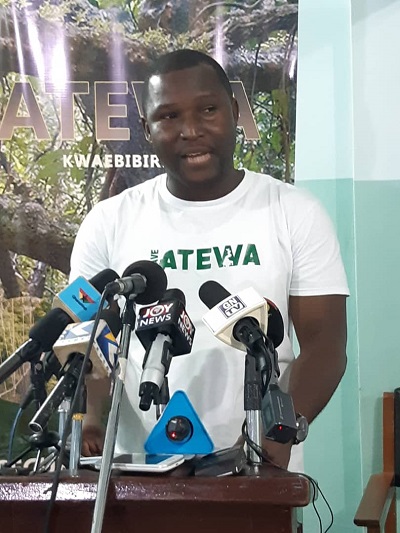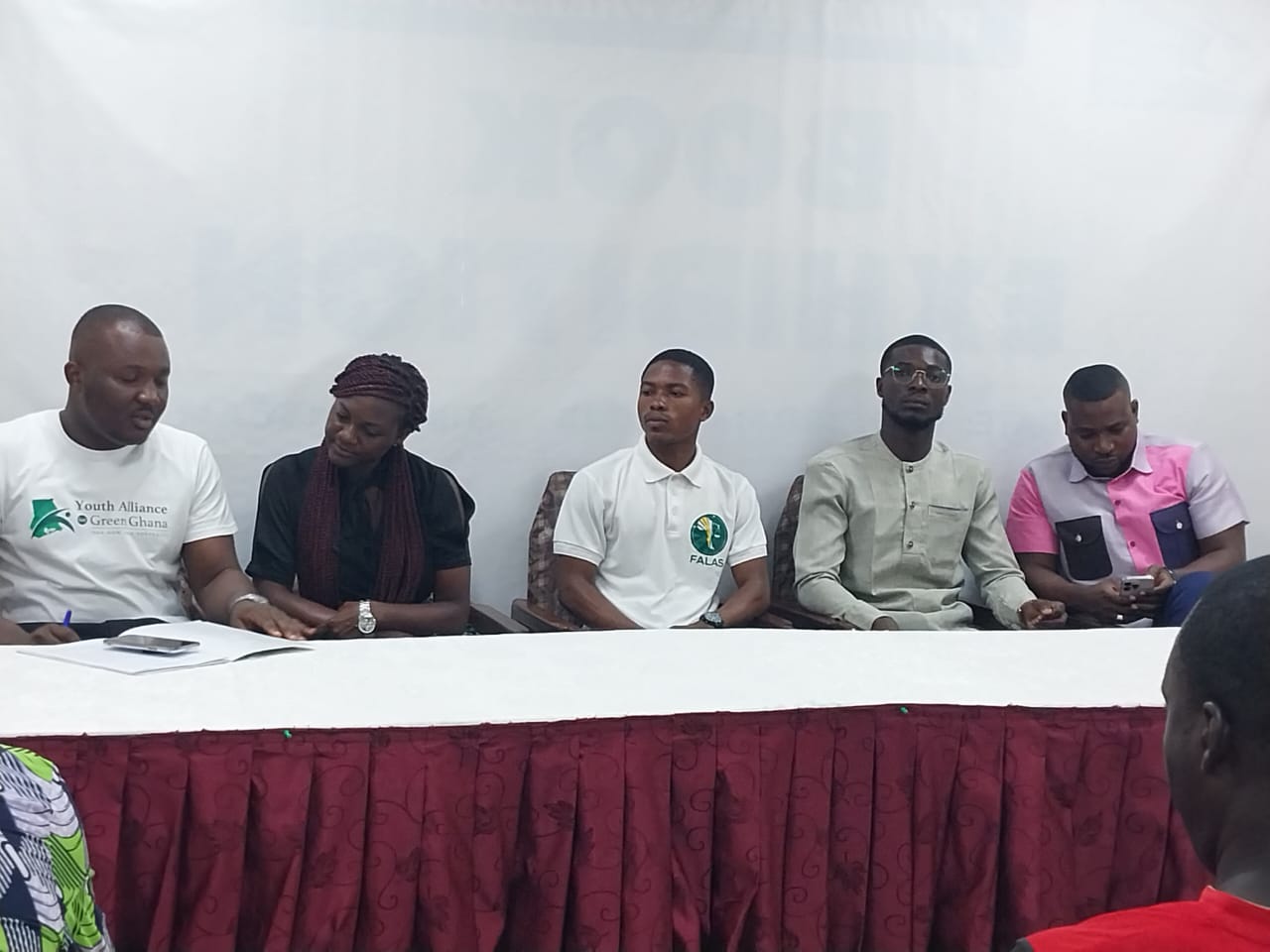Climate Change & Energy
Green Ghana Day: CSOs reject new L.I. granting unfettered access to forest destruction
Source: Ghenvironment.com - June 9, 2023

File Photo
Some Civil Society Organisations (CSOs) and Non-Governmental Organisations (NGOs) have kicked against a new Legal Instrument (L.I.) granting unrestrained access to the destruction of Ghana’s forest reserves.
The organisations are A Rocha Ghana, Nature Development Foundation, Eco-conscious Citizens, Youth Alliance for Green Ghana and Ghana, Youth Environment Movement and Alliance for Social Equity And Public Accountability.
Addressing a press conference today to discuss issues of mining in Ghana’s forest reserves, illegal mining as well as matters of Intergenerational Equity, Deputy Director of A Rocha Ghana, Mr Daryl Bosu revealed that, in November 2022, a new Legal Instrument L.I. 2462 ‘Environmental Protection (Mining in Forest Reserves) Regulations’ was quietly passed and Civil Society only became aware of this clandestine action by the EPA and government in March 2023.
He said, while the 2018 ‘Environmental Guidelines for Mining in Production Forest Reserves in Ghana’ that preceded the new L.I. allowed a maximum of 2% of the production areas of forest reserves to be mined, the new regulations have no such restriction.
“Consequently, after the L.I. was passed, mining permits covering large portions of forest reserves have been granted, including Nkrabia, Boin Tano, Anhwiaso East, and Tano Anwia”, he said.
Mr Bosu revealed further that, the 2018 Environmental Guidelines excluded Globally Significant Biodiversity Areas (GSBAs) such as Tano Offin and Atewa Range Forest Reserves from any mining or exploration but under the new L.I., however, the President can approve mining in these uniquely critical areas if it is “in the national interest”.
He added “It appears this relates directly to government’s bauxite mining plans for these two GSBAs. That said, the Boin Tano Forest Reserve – also a GSBA – is already under a gold mining lease that was applied for and granted as soon as the L.I. was passed. It is not known if this lease has the mandatory Presidential approval, or even how it can be in the ‘national interest’”.
He said, while the L.I.’s procedures for minerals prospecting – currently banned in all forest reserves – are very strict, those for mining are not, adding that, available evidence suggests that mining companies are going directly for full mining leases to access the reserves without initial prospecting.
He asked ‘Is this legal, and does this mean they will be prospecting under a mining lease”.
He explained that, under the L.I., a mineral right holder is required to establish and manage an area at least 3x the size of the mining concession as a biodiversity offset and communities need to be very wary because this would affect their lands.
He said, there is also no firm requirement for forest restoration and a mineral right holder can instead offset reclamation by establishing a plantation at least 3x the impacted area.
“There is a significant weakening of the 2018 Environmental Regulations that civil society considers completely unacceptable and a very grave threat to the future of Ghana’s forest reserves that all Ghanaians depend on for ecosystem services. Rather than regulating for environmental protection, it appears the new L.I. aims to support permission for mining across 100% of Ghana’s forest reserves”.
He noted that, government remains silent on forest damage by mineral rights holders and instead places all the blame on galamsey.
“The Apamprama Forest Reserve is a significant case in point. Government’s 2nd May address on the State of the Nation’s Forest Reserves showed that 49.4% of this reserve has been destroyed, identifying galamsey as the ONLY culprit. It failed to mention that this forest reserve has been under three mining licences since 2018, these being a prospecting licence (2018-2021, across the whole reserve) and two mining leases, one along the River Offin inside the reserve (licence code ML6/3, expires 2032) and the other across the whole reserve area (licence code PL6/393, expires 2030). But government remained completely silent on this.
“Of the 47 Forest Entry Permits recently exposed for prospecting in 31 forest reserves, 11 reserves had multiple licences (such as Oda River with 5, Desiri with 4, Apamprama with 3). The 3 reserves identified with a RED status, meaning they are active galamsey sites and difficult to control without military support, had 10 licences between them. Those reserves are Oda River, Subin Shelterbelt and Apamprama. Whether or not all these licences were acted on is difficult to know, but as shown for in Apamprama, there could well be a link between licensed mining and the difficult-to-control galamsey”, he said.

Daryl Bosu
According to Mr Bosu, there is real concern that L.I.2462 would accelerate the destruction of the already highly depleted forest estates.
He advised the Forestry Commission to stop granting any Forest Entry Permits for mining in forest reserves, while the Minerals Commission should immediately revoke ALL mining licences in the reserves, beginning with those granted to irresponsible companies, adding that, the L.I.2462 must also be revoked and replaced with an Act that bans all mining in forest reserves.
He observed that Ghana’s forests provide critical ecosystem services and resources such as clean water to support the health and welfare of all Ghanaians, especially rural communities whose environmental rights are being completely ignored.
He said, the forests must be fully protected from all mining, both government-licensed and galamsey, otherwise, their integrity and capacity to support life will soon be gone.
He pointed out that, government’s Green Ghana Day can plant 500 billion trees every year, but it can never bring back Ghana’s old growth forests, saying that, until the government takes active steps to secure all forest reserves Green Ghana Day would continue to be a “green washing agenda by the government to distract all of us from their terrible record of securing forests and biodiversity in Ghana”.
On his part, the National Director for Youth Alliance for Green Ghana, Kenneth Egyir called on the government to enforce the laws that regulate mining activities in the country and crack the whip on those who flout them even with persons within government in demonstration of its real commitment to greening Ghana beyond the pomp and funfair of the Green Ghana Day activities.

Some members of the CSOs at the press conference
He also called on all relevant state institutions, particularly the Environmental Protection Agency (EPA) to hit the ground running in taking concrete and productive action to quickly address the menace of illegal mining and other such destructive activities.
“As a matter of urgency, we further call on the government to adopt an intergenerational equity approach in its management of Ghana’s resources. This means that the actions and decisions taken by the government in the management and use of the natural resources this country is abundantly blessed with, must be in the interest of not only the current generation or for a political tenure, but more importantly, for generations to come.
“To our fellow resourceful and energetic youth, we need to recognize that the damage caused by illegal mining affects us directly, and it is our responsibility to take action to protect our environment and our future. We therefore call on all young people in Ghana to take an active role in environmental activism and advocacy. We must speak up and demand that our leaders take the necessary actions to address this issue. We must also take individual actions in our daily lives to reduce our environmental footprint and promote sustainable practices”, he added.
Bright Kwaku
June 9, 2023
Awula Serwah
June 10, 2023
 Daryl Bosu
Daryl Bosu
 Some members of the CSOs at the press conference
Some members of the CSOs at the press conference

 File Photo
File Photo
 Daryl Bosu
Daryl Bosu
 Some members of the CSOs at the press conference
Some members of the CSOs at the press conference
Bright Kwaku
June 9, 2023